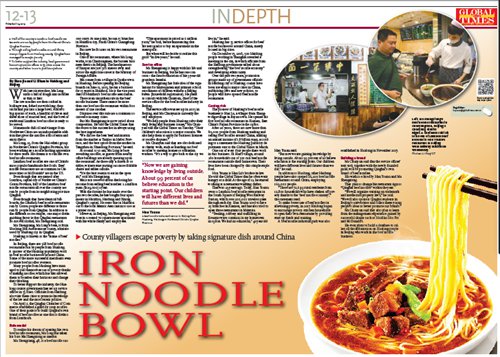○ Half of the country's Lanzhou beef noodle restaurants are run by people from Northwest China's Qinghai Province
○ Through selling beef noodles around China, many villagers from Hualong county, Qinghai have managed to escape poverty
○ To better support the industry, local government has set up service offices in 53 cities across the country and taken tours to publicize policies
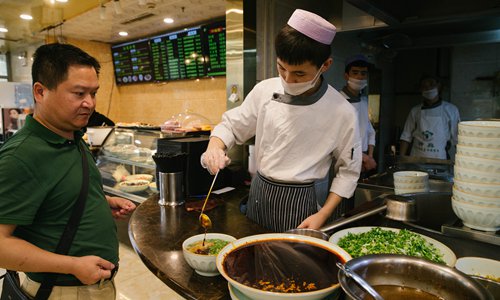
A chef adds chili oil to a bowl of Lanzhou beef noodles in Han Younu's restaurant at Beijing West Railway Station on Wednesday. Photo: Li Hao/GT
With just six stretches, Ma Long turns a ball of dough into noodles as thin as hair. The raw noodles are then cooked in boiling water, fished out with long chopsticks and put into a large bowl. Add two big spoons of stock, a handful of chives and three slices of sourced beef, and the bowl of traditional Lanzhou beef noodles is ready to be served. Homemade chili oil and vinegar from Northwest China are an indispensable addition that gives the noodles a bit of extra and exotic flavor. Ma Long, 23, from the Hui ethnic group in Northwest China's Qinghai Province, has been working as a noodle-making apprentice for three years. His dream is to run his own beef noodle restaurant. Lanzhou beef noodles are one of China's most popular handmade fast foods. Beef noodle restaurants are as common in Chinese cities as McDonalds' are in the US. Even though they are named after Lanzhou, capital city of Northwest China's Gansu Province, half of the Lanzhou beef noodle restaurants all over the country are run by people from its neighboring province Qinghai. Even though they have identical billboards, the Lanzhou beef noodle restaurants run by Gansu people are different to those run by people from Qinghai. In addition to the different secret recipes, one major distinguishing factor is that Qinghai restaurants do not sell alcohol, Ma Shengxiang said. Ma Shengxiang, Ma Long's boss, is from Hualong Hui Autonomous county, administered by Haidong city in Qinghai. Hualong is known as the "home of beef noodles." In Beijing, there are 368 beef noodle restaurants run by people from Hualong. A quarter of the Hualong population work in beef noodle businesses around China. Some of the more successful merchants even promote beef noodles overseas. Many people from Hualong have managed to pull themselves out of poverty thanks to making noodles, which has also allowed them to broaden their horizons and change their thinking. To better support the industry, the Hualong county government has set up service offices in 53 cities. Officials from Haidong also visit these cities to promote knowledge of the law and the most recent policies. On April 2, the Qinghai Chamber of Commerce established a guild for soup noodles. One of their goals is to build Qinghai's own brand of beef noodles as one that is distinct from Lanzhou's. Ma Shengxiang's beef noodle restaurant in Chaoyangmen, Beijing's Chaoyang district.
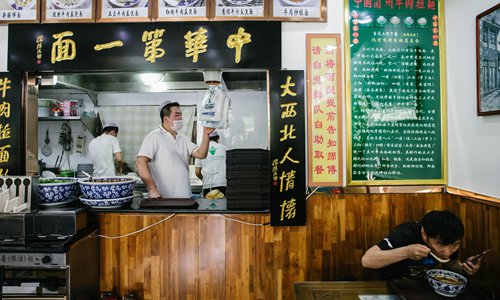
Photo: Li Hao/GT
Role model
To realize his dream of opening his own beef noodle restaurant, Ma Long has taken his boss Ma Shengxiang as mentor. Ma Shengxiang, 48, is a beef noodle success story: At one point, he ran 15 branches in Huizhou city, South China's Guangdong Province. But now he focuses on his two restaurants in Beijing. One of his restaurants, where Ma Long works, is in Chaoyangmen, the busiest business district in Beijing. The headquarters of Sinopec are just 300 meters away and across the eight-lane street is the Ministry of Foreign Affairs. Ma comes from a village in Qunke town in Hualong. Before opening his Beijing branch on June 11, 2015, he ran a business for 15 years in Huizhou. He is the vice president of Huizhou's beef noodle association. There is an unspoken rule in the beef noodle business: There cannot be more than one beef noodle restaurant within 800 meters of one another. Disputes over this rule are a common occurrence in many cities.

Ma Shengxiang's beef noodle restaurant in Chaoyangmen, Beijing's Chaoyang district Photo: Li Hao/GT
But Ma Shengxiang is not worried about competition. He told the Global Times that the secret to his success lies in always using the best ingredients. "We choose the best beef and mutton from the market at Yanjiao in Hebei Province, and the best spices from the market in Tengzhou in Shandong Province," he said. At around 11:30 am, Ma Long is busy stretching noodles, as guests from nearby office buildings are already queuing up in the restaurant. As there only a dozen or so tables, waiters start putting out more foldable chairs and tables outside. "It's the best season to eat in the open air," said Ma Shengxiang. Ma is not reserved about disclosing his income from selling beef noodles: 1.2 million yuan ($129,000) a year. With the fortune he has made over the past two decades, he has bought four apartments in Huizhou, Haidong and Xining, Qinghai's capital. He rents one in Huizhou out to the local Islamic Association to use as a prayer room. However, in Beijing, Ma Shengxiang still lives in a rented 70-square-meter apartment with his whole family and employees. "This apartment is priced at 6 million yuan," he said, before announcing that his next goal is to buy an apartment in the metropolis. But when will he decide to realize this goal? "In five years," he said.

Service office
Ma Shengxiang is happy with his life and business in Beijing, but he has one concern - the future education of his 3-year-old grandson Ismalai. Ma Shengxiang has little idea of the regulations for kindergarten and primary school enrollment of children without a Beijing hukou (household registration). He plans to consult with Ma Chunyun, chief of the service office for the beef noodles industry in Beijing. The service office was set up in 2003 in Beijing, and Ma Chunyun is currently the only employee. "We help people from Hualong solve their daily living and business issues," Ma Chunyun told the Global Times on Tuesday. "Their children's education is a major concern. We also help them to apply for business licenses or resolve disputes."
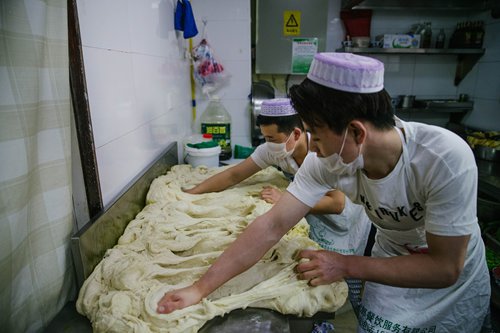
Ma Shengxiang's beef noodle restaurant in Chaoyangmen, Beijing's Chaoyang district Photo: Li Hao/GT
Ma Chunyun said they are also dedicated to charity work, such as handing out beef noodles to nursing homes or sanitation workers. "It's a way to give back to the city we live in," he said. Hualong has 53 service offices for beef noodle businesses around China, mostly located in big cities. On December 17, 2018, 500 Haidong people working in Shanghai attended a meeting in the city, in which officials from the Haidong government talked about strengthening "the beef noodle economy" and developing ethnic unity. Over the past two years, promotion groups made up of government officials in Haidong city or Hualong county have been traveling to major cities in China, publicizing laws and new policies, to people who have opened beef noodle restaurants.
Getting rich
The pioneer of Hualong's beef noodle business is Han Lu, a villager from Shangwoliga village in Bayan town. He opened his first beef noodle restaurant in Xiamen, East China's Fujian Province in the 1980s. After 20 years, there are now more than 80,000 people from Hualong making and selling beef noodles around China, making an annual income of 1.8 billion yuan, according to a statement the Haidong publicity department sent to the Global Times in March. One out of every four people there work in this business. In Han's village, around 280 households out of 300 run beef noodle restaurants outside their hometown. Their lives have been changed by this simple staple food.
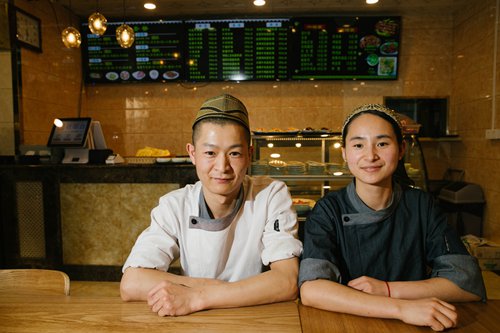
Han Younu's restaurant at Beijing West Railway Station Photo: Li Hao/GT
Han Younu is Han Lu's brother-in-law. He told the Global Times that he often went hungry as a child. At the age of 12, he started working at a restaurant washing dishes. That was 29 years ago. Today, Han Younu owns a Lanzhou beef noodle restaurant in the South Square of Beijing West Railway Station, which sees 200,000 travelers pass through each day. Han Younu used to have 25 branches in Xiamen, and has also tried to open three restaurants in Malaysia. "Stealing, robbery and trafficking in firearms were common in my hometown in 1980s. We had no education," 41-year-old Han Younu said. "But now we are gaining knowledge by living outside. About 99 percent of us believe education is the starting point. Our children will have different lives and futures than we did," he said. In addition to Hualong, other Haidong people have also opened 26,200 beef noodle restaurants around China, employing 169,000 people. "There are 72,699 rural residents from 12,800 households who have shaken off poverty thanks to the 'beef noodle economy'," the statement read. To make better use of beef noodles in alleviating poverty, in 2017 Haidong began to encourage poverty-stricken households to open their own restaurants by providing start-up funds and training. A beef noodle industrial park was also established in Hualong in November 2017.
Building a brand
Ma Chunyun said that the service offices' next task, together with the newly founded guild, will be promoting Qinghai's own brand of beef noodles. His wish is echoed by Han Younu and Ma Shengxiang.
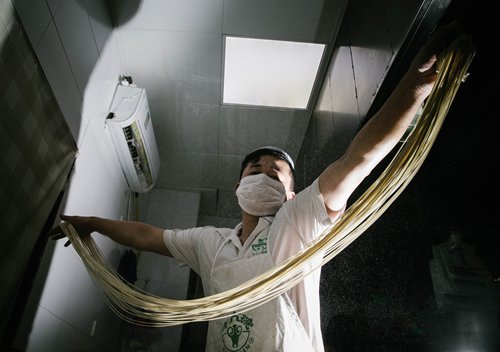
Ma Shengxiang's beef noodle restaurant in Chaoyangmen, Beijing's Chaoyang district Photo: Li Hao/GT
They plan to change his restaurant sign to "Qinghai beef noodles" within the year. "We will organize training on trademark and intellectual property laws," he said. "We will also sponsor Qinghai students in Beijing's universities and collect these young people's ideas to better promote our brands." Ma Chunyun said they also plan to learn from the management experience gained by successful chains such as Haidilao Hot Pot and McDonald's. He even plans to build a database to collect all the information on Hualong people in Beijing who work in the beef noodle business.
